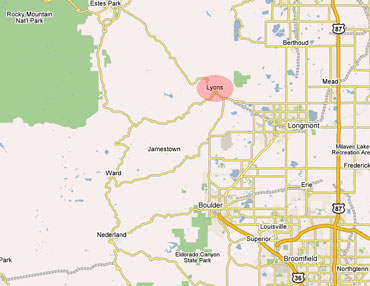Lyons, Colorado
Project Background
The town of Lyons, Colorado, located about 12 miles north of Boulder, was one of the places in northern Colorado most drastically affected during the historic floods of September 2013.
The landscape was severely altered as a result, particularly the Confluence neighborhood where the North and South Saint Vrain Rivers merge.
Lyons suffered heavy damage to homes, infrastructure, parks, and the river corridor.
CPAT provided technical assistance to Lyons as it faced difficult decisions on how to redevelop in a way that supports the community's goals for sustainable neighborhood design, affordable housing, environmental preservation, resilience, and economic sustainability.
Living With the Saint Vrain
Community Planning Assistance Team Report
Because of damage to local and regional utilities and infrastructure, Lyons was cut off from its neighbors and left without power, telephone service, and potable water. The entire Town was forced to evacuate on September 14, 2013, and the first residents were not allowed to return until late October.
Project Updates
May 15, 2014
The team presented their week’s work at the high school, which included a formal presentation along with a poster display. Residents asked the team questions following the presentation, then gathered around different posters afterwards to discuss the team’s recommendations and findings.
May 12, 2014
The team's first day in Lyons included a meeting with members of the citizen-led, Recovery Advisory Committee, who provided an overall summary of the impacts from the flooding event of September 12, 2013, an update on the town's ongoing recovery efforts, and other background information. Lyons Town Administrator, Victoria Simonsen, led the team on a tour of the flood-damaged areas. Others on the tour included: the Town Housing Coordinator, Rosi Dennett, AICP; Michelle Allen, Chair of the Lyons Planning and Community Development Commission; and Anne Miller, AICP, Senior Planner with the Colorado Department of Local Affairs. After the tour, the team met further with Town staff, then discussed their observations from the day and began generating preliminary ideas. In the evening, the team sat in on an update to the Board of Trustees from one of the citizen-led Recovery Work Groups that presented their latest work on developing a holistic approach to the area's watershed. Right after the Recovery Group's meeting, the CPAT members were introduced. They then explained the CPAT process and engaged the residents on what they'd like to see in the study area.
April 2014
FEMA's Capacity Building (CPCB) Recovery Support Function (RSF) quarterly newsletter covered the Lyons CPAT.
February 2014

Map of Lyons, Colorado
Team leader Gavin Smith, AICP, and APA project manager Ryan Scherzinger visited the Boulder and Lyons area, February 28-30, 2014. Upon arriving, they visited the University of Colorado-Boulder, where Smith provided a lecture for a graduate planning course on hazards. The students are also currently assisting the Town of Lyons throughout the spring semester. During the class, one student provided an overview of Lyons's history and other background information related to the flooding event of September 2013. Smith and Scherzinger then met with Chantal Unfug (Director, Division of Local Government, Colorado Department of Local Affairs) and Iain Hyde (State Disaster Recovery Manager, Colorado Department of Public Safety) followed by a meeting with FEMA representatives. The next day, they met the Lyons Recovery Advisory Committee followed by tour of many of the flood-affected areas in Lyons. During lunch, they met again with a larger group of the resident-led Recovery Advisory Committee to discuss the most pressing issues and how the CPAT could be most effective to their recovery planning process. The two met with a smaller Recovery Work Group to discuss in more detail an appropriate scope of work for the CPAT project. Finally, the group embarked on an additional tour of the area.
News Coverage of the Lyons Project
Daily Camera: "Should Lyons build housing on park lands?"
Community Voices
"The Town of Lyons is so very appreciative of the timely support of APA and the extremely helpful efforts of the CPAT. The team was very responsive to the community's needs and very professional in every aspect of their work here. They helped us focus our efforts on recovery at a very challenging time and were extremely patient with us as we struggled with the daunting tasks ahead of us. The CPAT produced professional maps and documents that our small town does not have the resources to produce, and they developed useful and applicable recommendations that will assist us in our recovery efforts. Thank you so much for your extremely valuable assistance."
-Victoria Simonsen, Lyons Town Administrator
"The national expertise brought by the CPAT was invaluable in providing Lyons with specific strategies for building a more resilient community that will help guide Lyons' long-term recovery efforts. The team was professional, thoughtful, and responsive to community needs. On behalf of the Colorado Department of Local Affairs, we commend the CPAT team members and APA for supporting Colorado recovery efforts."
-Anne Miller, AICP, Senior Planner, Colorado Department of Local Affairs
Videos
Lyons Fights Back
Crowdfunding for Lyons
Meet the Team

Team Leader
Gavin Smith, Ph.D., AICP

Team Member
David Perkes, AIA

Team Member
Darrin Punchard, AICP, CFM



